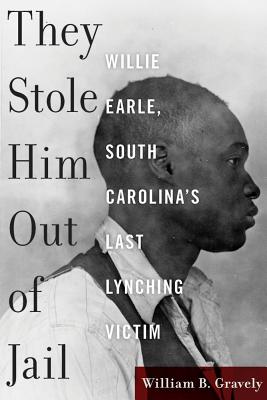They Stole Him Out of Jail: Willie Earle, South Carolina's Last Lynching Victim

They Stole Him Out of Jail: Willie Earle, South Carolina's Last Lynching Victim
Before daybreak on February 17, 1947, twenty-four-year-old Willie Earle, an African American man arrested for the murder of a Greenville, South Carolina, taxi driver named T. W. Brown, was abducted from his jail cell by a mob, and then beaten, stabbed, and shot to death. An investigation produced thirty-one suspects, most of them cabbies seeking revenge for one of their own. The police and FBI obtained twenty-six confessions, but, after a nine-day trial in May that attracted national press attention, the defendants were acquitted by an all-white jury.
In They Stole Him Out of Jail, William B. Gravely presents the most comprehensive account of the Earle lynching ever written, exploring it from background to aftermath and from multiple perspectives. Among his sources are contemporary press accounts (there was no trial transcript), extensive interviews and archival documents, and the "Greenville notebook" kept by Rebecca West, the well-known British writer who covered the trial for the New Yorker magazine. Gravely meticulously re-creates the case's details, analyzing the flaws in the investigation and prosecution that led in part to the acquittals. Vivid portraits emerge of key figures in the story, including both Earle and Brown, Solicitor Robert T. Ashmore, Governor Strom Thurmond, and West, whose article "Opera in Greenville" is masterful journalism but marred by errors owing to her short stay in the area. Gravely also probes problems with memory that resulted in varying interpretations of Willie Earle's character and conflicting narratives about the lynching itself.
Although the verdict was in many ways a victory for white supremacy during the waning years of Jim Crow, it still drew unprecedented public attention to the horrors of lynching, and no similar event has occurred in the state since. Yet, more than seventy years later, the crisis in criminal justice--especially as it pertains to African Americans, who are incarcerated at far higher rates than whites--remains a national challenge. This book is a compelling reminder not only of past traumas but of how far South Carolina and the country has yet to go.
PRP: 264.69 Lei
Acesta este Pretul Recomandat de Producator. Pretul de vanzare al produsului este afisat mai jos.
238.22Lei
238.22Lei
264.69 LeiIndisponibil
Descrierea produsului
Before daybreak on February 17, 1947, twenty-four-year-old Willie Earle, an African American man arrested for the murder of a Greenville, South Carolina, taxi driver named T. W. Brown, was abducted from his jail cell by a mob, and then beaten, stabbed, and shot to death. An investigation produced thirty-one suspects, most of them cabbies seeking revenge for one of their own. The police and FBI obtained twenty-six confessions, but, after a nine-day trial in May that attracted national press attention, the defendants were acquitted by an all-white jury.
In They Stole Him Out of Jail, William B. Gravely presents the most comprehensive account of the Earle lynching ever written, exploring it from background to aftermath and from multiple perspectives. Among his sources are contemporary press accounts (there was no trial transcript), extensive interviews and archival documents, and the "Greenville notebook" kept by Rebecca West, the well-known British writer who covered the trial for the New Yorker magazine. Gravely meticulously re-creates the case's details, analyzing the flaws in the investigation and prosecution that led in part to the acquittals. Vivid portraits emerge of key figures in the story, including both Earle and Brown, Solicitor Robert T. Ashmore, Governor Strom Thurmond, and West, whose article "Opera in Greenville" is masterful journalism but marred by errors owing to her short stay in the area. Gravely also probes problems with memory that resulted in varying interpretations of Willie Earle's character and conflicting narratives about the lynching itself.
Although the verdict was in many ways a victory for white supremacy during the waning years of Jim Crow, it still drew unprecedented public attention to the horrors of lynching, and no similar event has occurred in the state since. Yet, more than seventy years later, the crisis in criminal justice--especially as it pertains to African Americans, who are incarcerated at far higher rates than whites--remains a national challenge. This book is a compelling reminder not only of past traumas but of how far South Carolina and the country has yet to go.
Detaliile produsului









